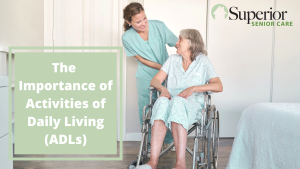
What Are Activities of Daily Living?
Activities of daily living are the basic skills that people need to take care of themselves properly. These skills fall into six categories of physical needs; eating, dressing, bathing/personal hygiene, toileting, continence, and mobility. Some seniors may be able to complete certain ADLs independently and safely but may have lost the ability or skills to complete others.
What Do Activities of Daily Living Measure?
Care professionals use ADLs to indicate the functional status of their clients. The details of how independent or dependent the client is will help determine the level of care that is needed and what or if any supportive services should be included in their care plan.
How Do Age and Health Conditions Affect One’s Ability to Perform ADLs?
Generally, the family members of a senior are the first to notice a decline, often through changes in routines or appearances. These changes are red flags that can indicate an underlying issue that could be interfering with the senior’s ability to perform normal self-care. It could be due to general age-related weakness or a medical condition.
There are many factors that can contribute to a senior’s ability to perform ADLs. In otherwise healthy individuals, the natural decline that happens as people age can cause impairment in physical functions. Many health conditions can affect a senior’s musculoskeletal, neurological, circulatory or sensory systems causing issues with performing ADLs. Social isolation or medication side effect are some other factors that can make self-care difficult for a senior, the senior’s home situation can also be a factor that may make it unsafe for them to perform certain ADLs.
Some examples of indicators of declining ADLs could be, noticing that your loved one is wearing the same outfit every time you see them or a significant change in their personal hygiene practices. The underlying issue could be a loss of flexibility or dexterity, or even a fear of falling. Usually, all that is needed is to find a new solution to help them adapt to the decline. Sometimes, this can be as simple as buying clothing with elastic waistbands or velcro fasteners, shower mats and chairs, or installing grab bars. If the decline is affecting cognitive function, energy levels, balance, or coordination, it might be an indicator of a need for assistance either from a family member or a home health aide.
Many seniors fear moving away from their home and losing their independence, so are more reluctant to tell anyone if they are having problems performing their ADLs. However, with a customized care plan that evaluates the client’s ADL needs, most people can continue aging in place, safely and independently while also making sure that all their needs are met.
Why Are ADLs Important?
Quality of life is greatly impacted by the ability to care for oneself by performing ADLs. When ADLs are not performed adequately, it can lead to problems such as poor personal hygiene, malnutrition, isolation, falls, and illnesses. Ensuring that your loved one has the help and care they need can prevent or alleviate health issues and can delay or eliminate the need for the senior to leave their home.
When a healthcare professional is determining what type of care and living situation is suitable for a senior client, they look at the client’s ability to perform ADLs. If the client needs ADL support, they will need to either have a family member or in-home caregiver come to them at their home or independent living facility or if a higher level of care is needed, they may need to move to an assisted living facility or nursing home, where ADL support is provided.
Many elder care services, benefit programs, and insurance coverages use ADLs as eligibility criteria for obtaining services. Programs such as; long-term care Medicaid programs, the VA’s Aid and Attendance pension and Social Security disability benefits all require an ADL questionnaire that demonstrates how their condition affects their daily life. It’s important to understand your loved one’s abilities and limitations in order to find the care options and services that they could qualify for.
How to Get an Activities of Daily Living Assessment
Through a statewide team of specially trained and licensed Registered Nurses, Superior Senior Care conducts comprehensive in-home assessments for clients requesting home care services. The goal of the assessment is to build a person-centered service plan that combines tasks needed for health and safety with the goals and preferences of the individual. The RN will assess for the level of assistance needed with daily activities and for home safety and will identify needs for home safety equipment or home modifications. We want to ensure safety and comfort, without taking away our clients’ independence. We also know that no two cases are the same and to achieve the utmost client success, care must be molded to meet the unique needs of each individual. Some of our clients choose to have their care in the morning, some in the evenings, some have special diets or prefer certain meals. All of this is considered during the service building process. Promoting true client-direction and a person-centered approach to home care is what sets Superior Senior Care apart from others in our industry.
Book your loved one’s free home assessment: Free In-Home Senior Assessment

